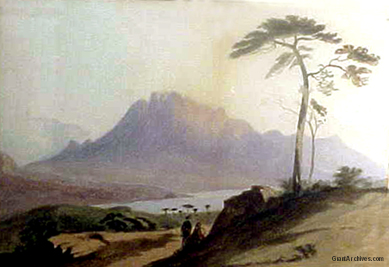 |
| Grant as a Brigadier General in 1861 |
We have finally reached the beginning of the end of the Meet the Generals series. If you know anything about Galena, you know that this man Ulysses S. Grant has played a big role in the community's image. I have actually benefited from Mr. Grant living in Galena, because I am a tour guide at his post war home (which will be discussed in the next section)
| General Grant's Birthplace |
Hiram Ulysses Grant was born on April 27, 1822 in Point Pleasant, Ohio. In the fall of the following year, Hiram and his family moved to Georgetown, Ohio so his father could expand his leather business. Unlike his younger siblings, Grant was neither disciplined, baptized, nor forced to attend church by his parents. Grant is said to have inherited a degree of introversion from his reserved, even "uncommonly detached" mother (she never took occasion to visit the White House during her son's presidency). At the age of 17, Grant entered the United States Military Academy (USMA) at West Point, New York, secured by Congressman Thomas L. Hamer's nomination. An opening had been made at USMA when a cadet from Georgetown resigned in October 1838. Hamer mistakenly nominated him as "Ulysses S. Grant of Ohio." In the 1800s it was common to have your child's middle name be its mother's maiden name (Simpson), also it should be noted that Grant was only called Ulysses through most of his childhood. Hamer, as a friend of the family, thought that his first name was Ulysses, and guessed at his middle name, regarding the era's customs. At West Point, he adopted this name with a middle initial only. His nickname became "Sam" among army colleagues at the academy, since the initials "U.S." stood for "Uncle Sam". The "S", according to Grant, did not "stand for anything."
The influence of Grant's family brought about the appointment to West Point; he himself did not wish to become a soldier. Grant graduated from West Point in 1843, ranking 21st in a class of 39. Part of Grant's demerits were due to his refusal, at times, of compulsorily church attendance; then a West Point policy that Grant viewed as anti-republican. Grant openly stated that he was lax in his studies; however, he achieved above average grades in Mathematics and Geology. At West Point, Grant studied under artist Robert Walter Weir and produced nine surviving artworks. Trained under Prussian horse master, Herschberger, Grant established a reputation as a fearless and expert horseman, setting an equestrian high jump record that lasted almost 25 years. Although naturally suited for cavalry, he was assigned to duty as a regimental quartermaster in the 4th U.S. Infantry, achieving the rank of brevet second lieutenant. He helped to manage supplies and equipment.
 |
| One of Grant's paintings he did at West Point in 1840, Grant gave this to his girlfriend Kate Lowe. |
 |
| Grant in 1843. |
Ulysses originally wanted to be a math professor when he attended West Point, but due to the lack of job openings, he decided to stick with a military career. His first military aoppointment was to Jefferson Barracks in St. Louis, Mo. That is where he met up with his good friend, Frederick Dent, Jr. Dent, invited Ulysses to stay at his home, and that is where he met his future wife Julia. Julia and Ulysses were engaged three months later, but due to the Mexcian War their marriage was put on hold for four years, they were finally married on August 22, 1848. Together Ulysses and Julia had four children Frederick (1850-1912), Ulysses (Buck) Jr. (1852-1929), Nellie (1855-1922), and Jesse (1858-1934).
Grant worked as a clerk in his father's leather shop (present-day Coatsworth Apartments) which was run by his two brothers Sam and Orville. His brother Sam would die of tuberculosis in 1860, the only member of the Grant family buried in Galena.
Grant was not involved in politics throughout much of his life. In the election of 1856, it was noted that he voted for James Buchanan, a democrat, due to his pledge to keep the Union together. Grant's father was a prominent Republican in Ohio, he never lived for a very long time in Galena because he was still operating his shop in Georgetown. His father-in-law was a prominent Democrat in St. Louis.
| Grant's prewar home |
Grant was swayed to the Republican Party and Lincoln after a masterful speech by his future chief of staff, and prominent Galena Republican John Rawlins, which told people to support the Union and fight for the country. Another key friend, and prominent Republican, Elihu B. Washburne (he will be discussed following the two-part series on Grant), would aid the General in his meteoric rise in the Army.
When the war broke out, Grant helped organize a group of volunteers from Galena, originally he did not want to take part in the war, but agreed to help organize Galena's regiment being that he was the only man in Galena with West Point experience. He would accompany it to Springfield, the capital of Illinois. He accepted a position offered by Illinois Gov. Richard Yates to recruit and train volunteers. Grant, who wanted a field command, was efficient and energetic in the training camps and made a positive impression on the volunteer Union recruits. With the aid of his advocate in Washington D.C.,Elihu Washburne, Grant was promoted to Colonel by Governor Richard Yates on June 14, 1861, and put in charge of the unruly Twenty-first Illinois volunteer regiment. By the end of August 1861, Grant was given charge of the District of Cairo by Maj. Gen John C. Fremont, an outside Lincoln appointment, who viewed Grant as "a man of dogged persistance, and iron will." Grant's own demeanor changed; having renewed energies, he began to walk with a confident step.To be continued....


No comments:
Post a Comment